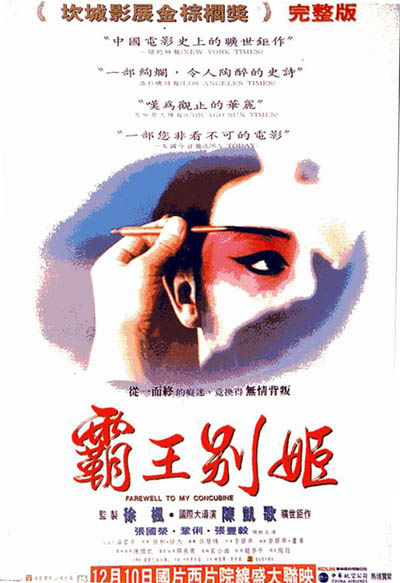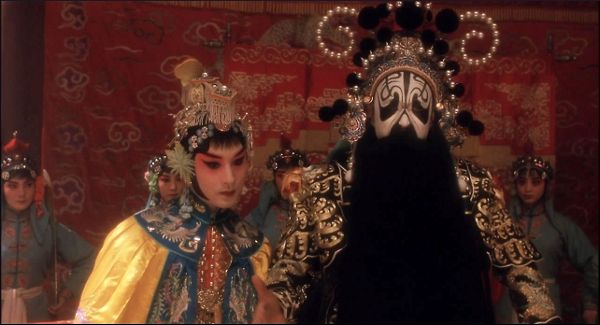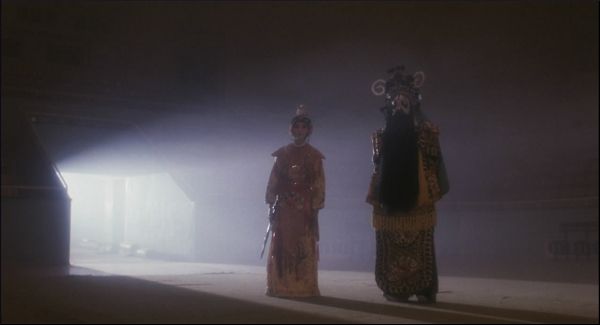
- Farewell My Concubine
- 171 minutes - History
- Original title: Bàwáng Bié Jī
- Director:Chen Kaige
- Language: English
- Country: China
Two Peking Opera actors live through 60 years of changes, revolutions, and social upheavals in mainland China.

Two Peking Opera actors live through 60 years of changes, revolutions, and social upheavals in mainland China.

Farewell My Concubine was made by Chen Kaige in 1993, and was initially banned by Chinese censors because of its subversive portrayals of suicide and homosexuality. However, its international acclaim made it the very first film from the People's Republic of China to win the Palme d'Or at the Cannes Film Festival. The movie spans half a century, covering the Warlords, the Japanese invasion of 1937, the Communist takeover of China, and the Cultural Revolution.
It starts with two orphan boys in a Peking Opera troupe. Douzi and Shitou are both talented, so their tutor pushes them quite hard since early childhood. After 13 years, their suffering pays off. Douzi (stage name Dieyi) is assigned the female role of the concubine Yu Ji, in the famous traditional opera Farewell My Concubine, while the more masculine Shitou (stage name Xiaolou) plays the emperor. Their lives seem inseparable on and off stage, until Xiaolou falls in love with the prostitute Juxian and marries her.
Dieyi’s jealousy clearly manifests his love for Xiaolou, while Xiaolou only loves Dieyi in a brotherly way. Ironically, despite Dieyi’s resentment, he has a subtle connection to Juxian, who somehow cares and even has strong compassion for Dieyi. Meanwhile, the historical backdrop of a country in upheaval affects the lives of individuals, families, and groups, in this case two stars of the Peking Opera and the woman who comes between them. The Chinese are generally familiar with these historical moments, but this movie helps us to imagine what it was like to live during those times. While watching, we are seized by the powerless feeling of being unable to control one’s own life, struggling against but inevitably caught in the whirlpool of the era.

What changes the characters the most, however, is the Cultural Revolution. In an era of extreme chaos, shrill young ideologues impose their brand of political correctness on older generations. They force the troupe that once performed for Japanese invaders to drop to its knees. The distortion of human nature exposes people’s hideous side, even towards their dearest friends. Xiaolou denounces Dieyi as a homosexual and, desperately, Dieyi counterattacks by denouncing his friend's wife, Juxian, as a prostitute. Trying to draw a clear distinction between him and Juxian, in order to avoid punishment, Xiaolou tells the crowds he does not love his wife. Humiliated and desperate, Juxian hangs herself.
After the Cultural Revolution, the developing nation finally went through its birth pangs, while the ancient and ritualistic art form, the Peking Opera, survived its death pangs. Somehow, after the Cultural Revolution, Xiaolou and Dieyi maintain their relationship, and the final scene sees them replaying their act once more on an old stage without an audience. Dieyi is obsessed with the opera and cannot separate his role from real life. As Xiaolou once says, “蝶衣,你可真是不疯魔不成活呀!”(Dieyi, you are so obsessed with the opera and without this obsession you cannot even survive). “不疯魔不成活” originates from Peking Opera jargon, and describes a kind of mad state of professionalism. To this day, people refer to Leslie Cheung, who portrays Dieyi, as “不疯魔不成活,” because of his delicately nuanced performance and dramatic life.
Originally, Farewell My Concubine is a play about Conqueror Xiang Yu's concubine, Yu Ji, who cut her own throat to avoid being taken by the forces of the new Han Dynasty emperor. The change of dynasty in the ancient story parallels the transition to the People's Republic of China, and Yu Ji's fatal devotion to her doomed Conqueror is echoed by Dieyi's obsession with Xiaolou. The thought-provoking story, the actors’ delicately nuanced performances, and the lavishly filmed Peking Opera make this a motion picture experience few will soon forget after leaving the theater.
